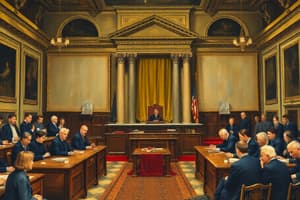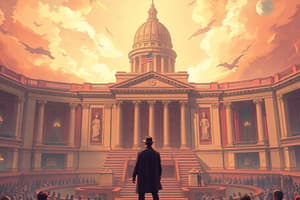Podcast
Questions and Answers
What is one of the major responsibilities of the Congressional Budget Office (CBO)?
What is one of the major responsibilities of the Congressional Budget Office (CBO)?
- To provide information and estimates for funding various agencies and programs (correct)
- To allocate funding for earmarks
- To create the federal budget
- To determine the amount of money Congress will spend on programs and agencies
Which of the following is NOT a power granted to Congress by the Constitution?
Which of the following is NOT a power granted to Congress by the Constitution?
- The power to appoint federal judges (correct)
- The power to declare war
- The power to ratify treaties
- The power to set the federal budget
What is the purpose of 'logrolling' in the context of budgeting?
What is the purpose of 'logrolling' in the context of budgeting?
- It's a system of trading votes to gain support for earmarks (correct)
- It's a method for making decisions about funding for national security
- It's a way to ensure that every state receives equal funding
- It's a process used to reduce the amount of money spent on earmarks
What is a major difference between 'oversight' and 'earmarks' in the context of congressional power?
What is a major difference between 'oversight' and 'earmarks' in the context of congressional power?
How does the system of checks and balances work in the context of the Budgeting Process?
How does the system of checks and balances work in the context of the Budgeting Process?
What was the primary reason the House of Representatives banned the use of earmarks in 2011?
What was the primary reason the House of Representatives banned the use of earmarks in 2011?
What is the primary function of congressional oversight?
What is the primary function of congressional oversight?
How does Congress exert control over the Supreme Court?
How does Congress exert control over the Supreme Court?
Which of the following is NOT a requirement to be a member of the House of Representatives?
Which of the following is NOT a requirement to be a member of the House of Representatives?
What is the main reason the framers of the Constitution created a bicameral legislature?
What is the main reason the framers of the Constitution created a bicameral legislature?
Which of the following is most directly related to the idea that "the people come first" in the Constitution?
Which of the following is most directly related to the idea that "the people come first" in the Constitution?
What is the primary difference between the House of Representatives and the Senate in terms of representation?
What is the primary difference between the House of Representatives and the Senate in terms of representation?
How does the length of a Senator's term compare to that of a Representative?
How does the length of a Senator's term compare to that of a Representative?
How does the example of the Dingell family illustrate the idea of terms in Congress?
How does the example of the Dingell family illustrate the idea of terms in Congress?
What is the most important power granted to Congress by the Constitution?
What is the most important power granted to Congress by the Constitution?
Which of the following is NOT considered one of the three main areas of Congress's powers?
Which of the following is NOT considered one of the three main areas of Congress's powers?
Flashcards
Bicameral Legislature
Bicameral Legislature
A two-chambered lawmaking body, like Congress.
Great Compromise
Great Compromise
The agreement that established a bicameral legislature.
House of Representatives
House of Representatives
The chamber of Congress directly elected and serving 2-year terms.
Senate
Senate
Signup and view all the flashcards
17th Amendment
17th Amendment
Signup and view all the flashcards
Term Limits in Congress
Term Limits in Congress
Signup and view all the flashcards
Powers of Congress
Powers of Congress
Signup and view all the flashcards
Legislative Authority
Legislative Authority
Signup and view all the flashcards
Enumerated Powers of Congress
Enumerated Powers of Congress
Signup and view all the flashcards
Power of the Sword
Power of the Sword
Signup and view all the flashcards
Power of the Purse
Power of the Purse
Signup and view all the flashcards
Congressional Budget Office (CBO)
Congressional Budget Office (CBO)
Signup and view all the flashcards
Pork Barrel Spending
Pork Barrel Spending
Signup and view all the flashcards
Logrolling
Logrolling
Signup and view all the flashcards
Oversight Authority
Oversight Authority
Signup and view all the flashcards
Checks and Balances
Checks and Balances
Signup and view all the flashcards
Study Notes
Congress & The Constitution
- Congress is the longest and most detailed article of the Constitution
- Bicameral Legislature (two-chambered) created by the Great Compromise
- Madison believed in checks and balances, and that the two chambers would check each other
Differences of the House and Senate
- House of Representatives:
- Directly elected by voters
- Serve 2-year terms
- Must be at least 25 years old
- US citizen for 7 years
- Resident of the state
- Senate:
- Originally chosen by state legislators, now directly elected by voters
- Serve 6-year terms
- Must be at least 30 years old
- US citizen for 9 years
- Resident of the state
- No term limits for members of Congress
Powers of Congress
- Legislative Authority: Power to make laws in national policy areas (economic, security, foreign)
- Budgeting: Sets the federal budget and funds agencies/programs
- Oversight: Ensures laws are implemented as intended, investigates wrongdoing
- Impeachment: Power to remove federal officials (President, etc.) through a process
The Budgeting Process
- Congress sets annual budget
- Congressional Budget Office (CBO) provides information & estimates
- Pork barrel spending (earmarks) may be used, though earmarks have been banned in some contexts
Exercising Checks and Balances
- Congress & other branches share authority over some government aspects (e.g., Congress declares war, Senate ratifies treaties; President commands armed forces)
- Congress checks the executive branch (President) by investigating and making oversight
- Senate confirms presidential appointments to courts, important bureaucracy positions
- Impeachment process: House brings charges, Senate tries the official; high majority needed for conviction
Studying That Suits You
Use AI to generate personalized quizzes and flashcards to suit your learning preferences.




